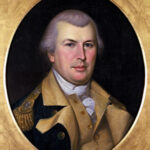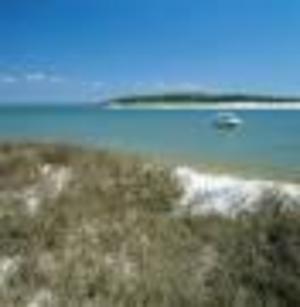The Battle of Dorchester Heights is a Revolutionary War battle that is unfortunately little known. Perhaps that is because there were no battlefield heroics, or, for that matter, any battlefield casualties. General George Washington was able to liberate the town of Boston from British occupation without a single shot being fired in what is today known as the Battle of Dorchester Heights.
As a result of what we call the Boston Tea Party in 1773, the port of Boston was closed and martial law was declared. This had the affect of shutting the town down. Many people fled the city, John Hancock and Samuel Adams being two of the more important exiles. And it wasn’t long before the peninsula of Boston would look more like a British Army encampment than a large colonial town. Out in the outlaying areas, however, Hancock and Adams and others were preparing for war. And after the war officially broke out in April, 1775, the Continental Army was established and George Washington’s first piece of business was to go to Massachusetts and to save the town of Boston.
There are two hills that overlook the town of Boston, the one we know today as Bunker Hill where a battle was fought in June, 1775, and Dorchester Heights. Strategically, Bunker Hill was more important for the British in regards to any countryside offensive they may wish to make. But Dorchester Heights overlooked the only water route in and out of Boston via Boston Harbor. So Washington decided that Dorchester Heights was the more important of the two for his Continental Army. So he decided that fortifying it should be his priority. Lacking canon to do it, Washington dispatched Henry Knox to Fort Ticonderoga on the Hudson River in New York to “liberate” cannon from the British Army there. In March, 1776, Knox returned with fifty-nine cannon, and Washington in one night was able to furtively fortify the Dorchester Heights by using hay to muffle the noise of the carts’ wheels. (Personally, I believe that this aspect has been over-hyped. If the British did not notice the colonists fortifying Bunker Hill, which is much closer and more easily seen from their positions in Boston, it is logically less likely that they would notice what was happening at Dorchester Heights. In my opinion, Washington used the muffling measure as a motivational tool to keep his men focused on the task at hand.)
British General Howe planned an immediate attack, almost impulsively, forgetting the failures of the British during the Battle of Bunker Hill. But when a storm swept into the Boston area on the eve of the impending battle, the battle was called off, and this gave General Howe and his aides a little more time to think about their predicament. The Bunker Hill attack was a fiasco for the British, but at no time was the British Navy under threat. This time, Washington had cannon, and the British Navy was indeed under threat. Howe came to comprehend that Washington had him boxed in. Negotiations would be the only way out for Howe. And for about two weeks Howe and Washington negotiated what would come to called the “Evacuation of Boston.” Howe did have one chip to play, and that the fact that he was holding the town of Boston, essentially as a hostage. He had promised Washington that any attack on the British navy would result in the complete burning of Boston. Not a single building would be left standing. So Washington agreed that Howe could completely withdraw his troops from Boston in peace.
General Howe would evacuate Boston on March 17, 1776, taking with him not only his army, but thousands of civilian Loyalists, who would obviously not feel comfortable staying behind. They would sail for Nova Scotia, where the Boston Loyalists would establish an unofficial colony expatriates.
Washington won the battle, and not a single shot was fired.
Today, there is a monument, the Dorchester Heights Monument, which stands at the top of the Heights of Dorchester Neck. (Today, the area is part of South Boston.)




